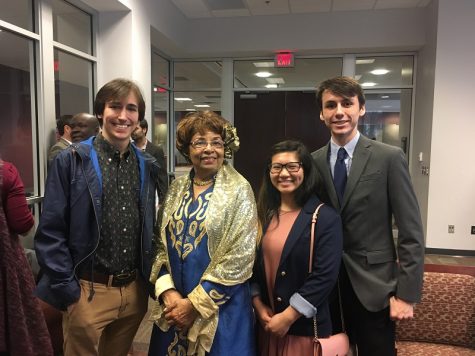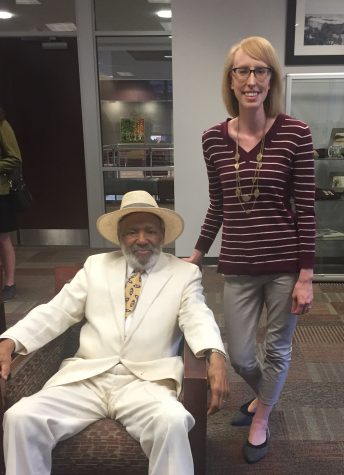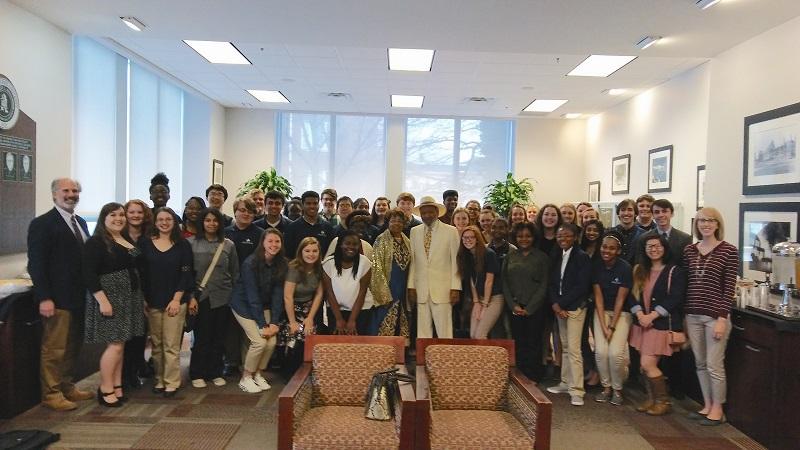The March Against Fear
MSMS students meet with Mr. James Meredith and Ms. Brown-Wright.
March 6, 2017
For many young people, it is easy to forget how recent and ground-breaking the actions of people like James Meredith, Flonzie Brown-Wright, and Hollis Watkins were, but students were reminded on Wednesday, March 1 in the “James Meredith and the March Against Fear” seminar that was hosted by the MSU African-American Studies program.
The seminar was preceded by an informal panel where students, myself included, had the opportunity to meet Meredith, Brown-Wright, and Watkins personally. I had the opportunity to shake hands with some of the most influential human rights giants in Mississippi history and ask them whatever questions we could think of.
When I asked Mrs. Brown-Wright what the most difficult part of the movement was for her, she responded, “When I would walk out of my door in the morning, there would be Klan members across the street holding shotguns … they would threaten the lives of my children.”

After speaking with Brown-Wright, I moved on to speak to Watkins, who joined the civil rights movement at the age of seventeen. By the age of nineteen, Watkins was an active member of the Student Nonviolent Coordinating Committee (SNCC), where he began to work by leading fellow protestors in singing freedom songs. Watkins led the attendees of the panel in a singing of “Ain’t Scared of Nobody ‘cause I Want My Freedom,” raising as many goosebumps as voices.
After hearing from Watkins, I finally made it around the reception room to meet James Meredith. I commended him on his bravery, stating that without people like him Mississippi would be a much more divided state than it is today. He responded, “Boy, you just insulted me. Have you ever seen a picture of me from back then? Did I ever look scared? No, to be brave, you have to have something to fear.”
After my discussion with Meredith, it was time for the actual program to begin. The seminar was opened by Dr. Aram Goudsouzian, renowned historian and author of Down to the Crossroads: Civil Rights, Black Power, and the Meredith March Against Fear, who welcomed the crowd and gave everyone a brief summary of the Meredith March.
After Dr. Goudsouzian left the podium, it was time for James Meredith to have the floor again, but this time in front of an entire auditorium and not just a small crowd. Meredith read his dissertation that was written when he was a student at Ole Miss, which he described as the “most important thing James Meredith ever did.
In his dissertation, Meredith gave a brief history of the African-American in the United States, shining a light on how, especially after the Civil War, there was never a clear position for African-Americans in the United States. Meredith stated, “The only thing clear about the position of the former slave was that they were not to enjoy the rights and happiness of white Europeans.” Despite the unhappy history of African-Americans, it is because of people like Meredith that there is a more even playing field for happiness in America today.

MSMS’s Dr. Hester meets Mr. James Meredith.
Following Meredith was Brown-Wright, who recounted her own history to the audience. “I was four years old when I realized the value of helping people,” Brown-Wright stated, referencing how she began serving people at the age of four when her and her mother helped an old blind woman keep her house clean.
Brown-Wright would take her career much further than this, as she would become the first African-American woman to serve in elected office in Mississippi, where she served as Election commissioner of Madison County.
Brown-Wright recounted her struggle as election commissioner to overturn the racist process that African-Americans had to go through to become registered voters. African-Americans had to answer a 21-question questionnaire, with some of these questions being “How many bubbles are in a bar of soap?” or “How many feathers are on a chicken?”
Brown-Wright spent years fighting to give the African-Americans of Mississippi the right to vote, so she takes voting very seriously. “If you do not vote, you have no voice,” she said. She then went to condemn the Democrats that stayed home on last year’s election day, stating that America was “great already.”
Brown-Wright finished her speech stating, “I have an assignment for all of you: never allow signs like these to appear in America again,” as she held up a sign that said “NO COLOREDS ALLOWED.”
Following Brown-Right was Watkins who, like Brown-Wright, became involved helping others as a child. At a young age, Watkins’s father told him, “I want you to always stand up for what is right, even if you are the only one standing,” which Watkins followed by heart.
Watkins urged all the young people in the audience to take action whenever they saw injustice in the world and to not be afraid of failure. “We should strive hard to look at ourselves and overcome ourselves … fear is the biggest thing that holds us back,” Watkins stated.
These three people helped transform Mississippi’s hate fueled polices and laws to what it is today, but Mississippi is still not perfect. In the words of Watkins, “Our work still isn’t over.”









